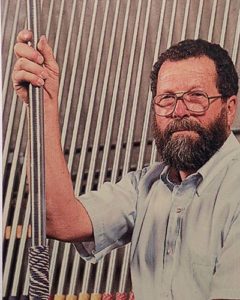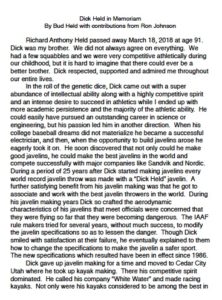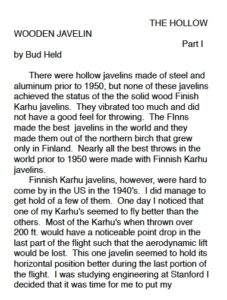thrower. How many of you have picked up one their javelins just to admire the
design and wonder how the heck you are supposed to compete in this event without
destroying your elbow? The intelligence and intellect of these two men is close to
the best nature or the creator could produce. I wish there were more like them in
all sport and the world. George Brose
Note: Please excuse the gaps in this post. It is neigh impossible to close them where
once there was some advertising.
From the San Diego Times March 21, 2018
By Ken Stone
March 21, 2018
 |
| Dick and Bud Held |
Dick Held, the javelin-maker whose name was synonymous with the track and field event, died Sunday after several years battling Alzheimer’s disease, his family said Tuesday.
x

Held was the world’s No. 1 javelin expert, said Juris Terauds,his friend of 50 years, declaring: “There’s no one else that comes close.”
In the early 1950s, Dick’s younger brother and lone sibling, Franklin “Bud” Held, engineered his own hollow javelins at Stanford and set world records in 1953 and 1955. He shared some of his wooden javelins with rivals such as Bill Miller and 1952 Olympic champion Cy Young.
But amateur rules at the time barred Bud, a 1952 Olympian, from selling his spears, so he asked Dick: Would you be interested in making javelins?
“And he said, ‘Well, yeah. Why not?'” Bud recalled Tuesday from his home in Del Mar. “At that time he was an electrician. … I honestly did not expect him to be that successful.”
But while Bud never thought Dick was that good mechanically, “it turns out he was. He produced the best javelins in the world for many years,” Bud said.
“Dick was always the best brother I could ever imagine. He always supported me. He admired me and my abilities. He complimented me and told people about me. He’d exaggerate. Just a wonderful brother.”
Held’s javelins spanned the era of wood, steel, aluminum, Fiberglass and carbon-fiber materials. Elite models were named after him, and many were used to set world records and win Olympic tiles — outdistancing rival implements made in Sweden and elsewhere.
“All of [the rival models] are based mainly on Dick’s javelin,” said Terauds, 80, a one-time Canadian record-holder in the event who became a biomechanics professor and consultant to Held — even building a javelin cannon called a Jav-A-Gun for testing.

“They tried to copy Dick’s javelin,” Terauds said from his home in Olivenhain.
Tom Petranoff, whose javelin career began at Palomar College in San Marcos, recalls meeting Held at Cal State Northridge in the early 1980s, when he was training with the likes of the late Bob Roggy, the world’s top-ranked javelin thrower in 1982.
“Dick was the first one to give me javelins,” Petranoff, 59, said from Vista. Driving eight hours from his home in Carson City, Nevada, Held would sit on a hill and study throwers at Northridge — “take notes on our [throwing] angles and all the other types of stuff that he saw.”
The next week, he’d return with another set of javelins.
“He became like a father figure to me,” said Petranoff, whose parents divorced when he was 11 or 12. “Someone who believed in me and told me that I was going to throw far. He gave me that little bit of belief — that was important to me. Dick was an amazing guy.”
Held also made the best javelins in the world, said Petranoff, who now produces a safe youth javelin called the TurboJav (made of Polyethelene; 42,000 sold last year). [The current world record, set in 1996 by Jan Železný, also was a Dick Held javelin.]
Bud Held, 90, wrote a 1,000-word “memoriam” with Ron Johnson — who was 19 when he met Dick at an AMF Pacer factory in 1982 and went on to start his own company.
Bud recalled: “During a period of 25 years after Dick started making javelins, every world record javelin throw was made with a ‘Dick Held’ javelin.”

Speaking from his home in Winston, Oregon, Johnson (whose website is thejavelinman.com) said Dick Held designed and he [Johnson] built the javelin that Petranoff and Germany’s Uwe Hohn used to set world records in 1983 and 1984 (327 feet 2 inches and 343-9¾).
Partly out of fear that javelins were flying too far — and could impale fans in the stands — the IAAF changed specifications to shorten flight distances. The world governing body moved the 8-foot spears’ center of balance forward 4 centimeters, forcing the sticks to drop sooner (and land point-first into grass, rather than flat).
Held rolled with the changes, perfecting the “new spec” javelin and also introducing the “High Moment” discus, his brother said.
“It took a few years, but the heavy rim weight discus eventually became the discus of choice among world class discus throwers,” Bud wrote. “In the 1996 Atlanta Olympic Games, the 2-kilogram OTE High Moment discus was thrown for the gold medal.”
Dick and Bud Held — who grew up in Los Angeles County and San Diego County’s Lakeside area — wrote a short history of their javelin collaboration.
At one point, during his production years, Dick recalled receiving a letter from an irate father.
“He had ordered a sixty-meter [rated] javelin for his daughter, but when she threw it, it only traveled forty meters,” Held wrote. “He threatened to sue me. I asked what his daughter’s best throw previous to receiving the Held javelin was, and he said, ‘About 38 meters, but this javelin says sixty meters on the shaft and it should fly sixty meters!'”
After working for several companies, and moving from place to place, Held retired in 1999 after a company called OTE was sold to Gill Athletics.
When Held’s wife, Betty, died about 2011, he fell into a serious funk.
“He came and stayed at my place many times,” Terauds told Times of San Diego, “especially after his wife died. He was down and really feeling lousy.”
So Terauds phoned his old partner and said: “Dick, what you really need to do is make a new javelin. So we did. … That was what pulled him out of the doldrums because he was working on something.”
Even so, “Betty was always there. He would always mention [her]. We’d be eating something and he would drift off to [think of] Betty. A huge part of his life.”
When Held was living in a Sun City care facility, losing his memory, Terauds called him every Sunday.
Any time they’d talk javelin, Held’s memory “would perk right up,” he said. “‘Remember, Dick, when we tried putting holes in the tail?’ Then everything starts clicking together [in his mind].”
The last time Petranoff saw Held was a little over a year ago, visiting for three or four hours and having lunch at his dementia center in the Phoenix area.
“He wanted to talk javelin, and him and Juris were involved in a carbon javelin that they were trying to build. Juris did it to keep his mind going,” Petranoff confirmed.
Richard Anthony Held was born June 17, 1926, in Los Angeles to Anthony Rutherford Held and Geneva Jane Held.
“Dick and I spent our early years in Agua Dulce, near Vasquez Rocks (a favorite scene of many old cowboy movies),” Bud said. “Our family moved to Lakeside in 1932 when Dad took over grandpa Dean’s (Mom’s father) lemon ranch.”
Held graduated from Grossmont Union High School in 1944.
“Dad was told by the principal that Dick had the highest entry IQ test of any student who had ever been tested at Grossmont High,” Bud said.
After two years in the military, the Held brothers drove together to Long Beach to take the Stanford entrance exam — two two-hour sessions.
“After 40 minutes of the first session, Dick got up, turned in his paper and left the building,” said Bud, who labored the full two hours. At lunch break, Bud found Dick outside and asked him: “Why did you leave?”
Dick replied: “I finished.”
The same happened at the afternoon testing. Stanford accepted him automatically, and “after that, I never doubted Dick’s academic ability.”
Bud graduated from Stanford cum laude with an engineering degree. Dick left Stanford during his first year largely because Stanford declared him ineligible for baseball as a result of some courses he had taken at San Diego State, Bud said.
Dick later earned a degree at San Diego State.
Dick and Betty were married in May 1948 — and their marriage lasted more than 60 years.
Terauds was asked what he enjoyed about Held.

“The main thing is Dick is a really good person,” said Terauds, who went on to invent the stair-stepper machine used in gyms worldwide. “He was a real friend of mine … because he was always honest. I could rely on him 100 percent.”
For Held, “it was never a case of this is good enough. It had to be perfect,” Terauds said in a phone interview. “The last project we were doing was before his memory started slipping away. … The javelin would fly approximately 4 meters further than anything out there right now. I still have those javelins.”
Said Petranoff: “Dick was the real deal. He was a man’s man. Didn’t have a big personality or anything. Kind of a quiet guy. But get a couple beers in him and he’ll loosen up a little bit.”
The world silver medalist — who paid Betty and Dick Held’s way to attend the 1983 IAAF championships in Helsinki — said “we really met at the right time at the right place. … It’s a sad day, but I’m relieved because I know it was not pretty where he was. … He deserves a lot more credit than he’s ever got.”
For Johnson, who angled his way into Held’s javelin department after working in the pole-vault section of the factory, Held “was a great man, really. … He was a fantastic engineer. He was a mentor. He was a man of integrity. He loved his wife. He was a perfect example of what a man should be.”
Forrest Held notified Johnson via email.
“We had a great summer together,” said the son. “He didn’t know who I was, but he knew when I showed up we were headed for his favorite ice cream place. I got to see more of him in the past few months than I did in the last four years.”
In his memoriam, Bud Held said: “Dick was a brilliant, fiercely independent, intensely honest, highly competitive and stubbornly self-confident man. He never took advantage of a friend, a worker or a competitor. He never cheated on his taxes or on his customers.”
Held, said his brother, was not afraid of death.
“After a stroke in his early 80s, Dick said ‘I faced death and I was not afraid. It was actually a pleasant and comfortable experience,’” Bud wrote.
“Dick never made a lot of money. It was not in his life plan. He followed his heart and desires and adjusted to wherever that took him. He had a satisfying life.”
Bud concluded: “I am proud of my brother. He is now gone, but am still here and proud of who he was, what he did and what he stood for.







